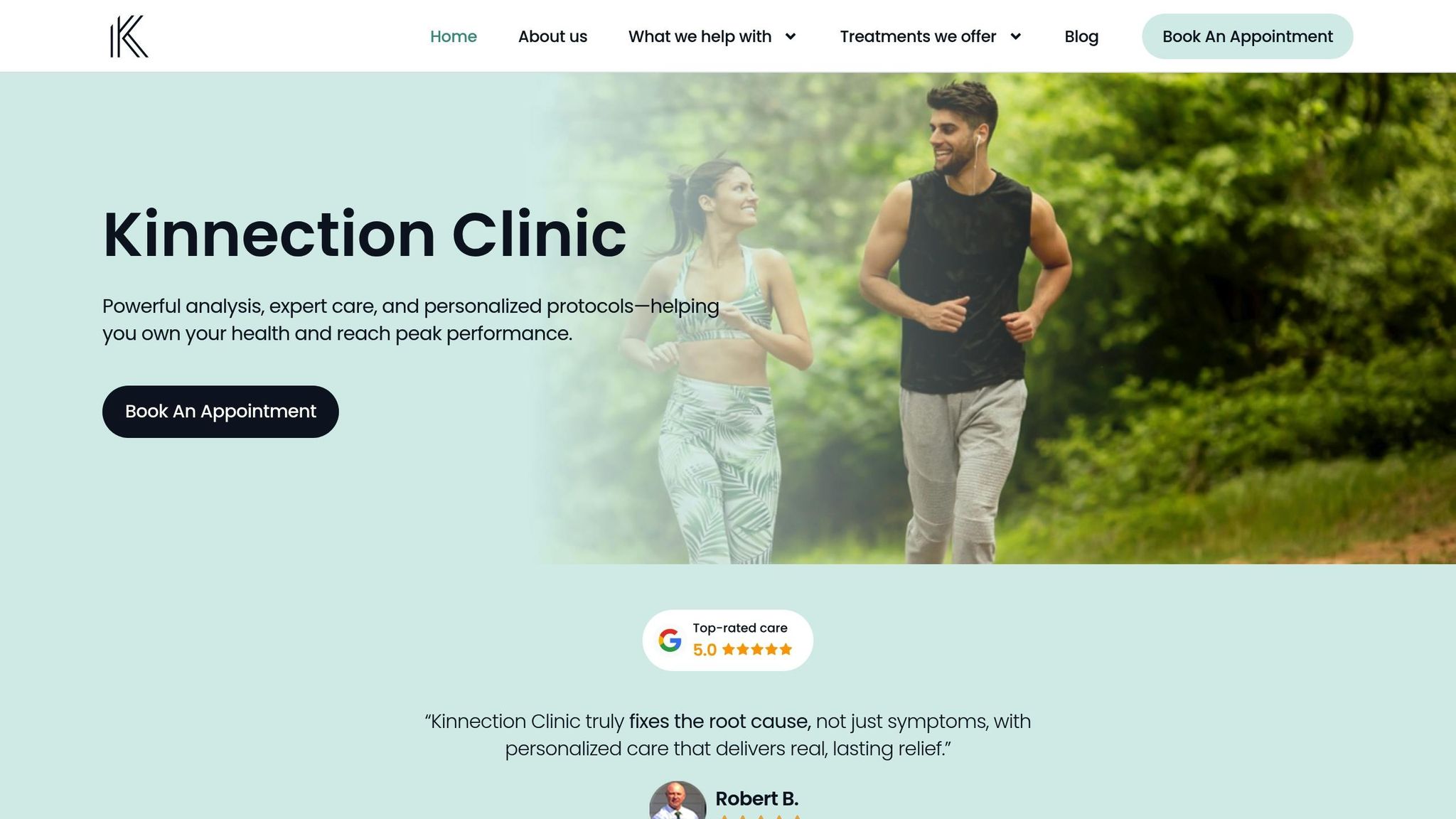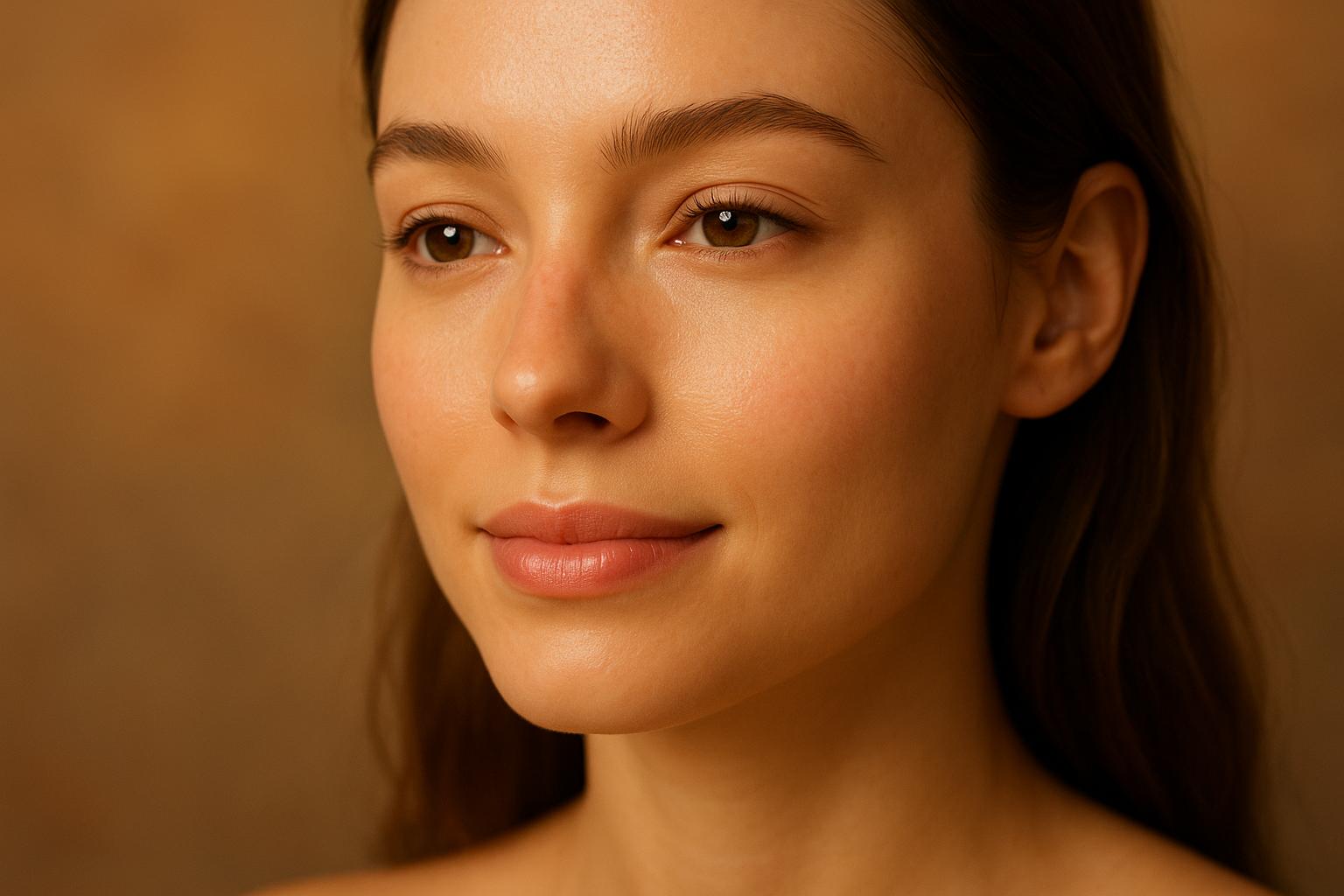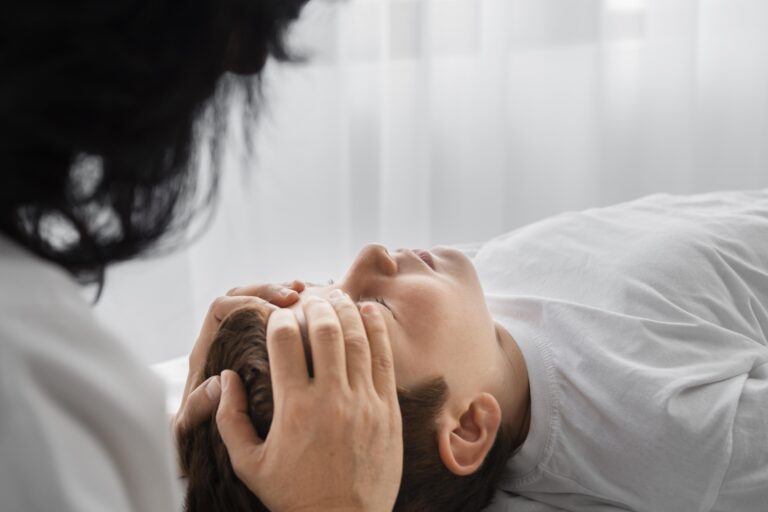Adrenal hormones like cortisol and DHEA play a direct role in how your skin ages. Cortisol, when elevated due to stress, damages collagen, weakens your skin barrier, and accelerates aging. In contrast, DHEA supports collagen production, moisture retention, and skin repair, but its levels naturally decline with age.
Key Points:
- Cortisol: High levels lead to inflammation, collagen breakdown, and wrinkles.
- DHEA: Promotes firmness, moisture, and cell renewal but decreases over time.
- Aging Impact: Imbalances, like higher cortisol and lower DHEA, speed up skin aging.
- Lifestyle Tips: Stress reduction, quality sleep, and a balanced diet can help regulate these hormones.
- Treatment Options: Hormone testing, DHEA supplements, and therapies like BHRT can improve skin health.
Balancing adrenal hormones through lifestyle changes and targeted treatments can help slow skin aging and maintain a youthful appearance.
Chronic Stress and Skin Aging ❘ TECH Global University
How Adrenal Hormones Cause Skin Aging
Adrenal hormones play a significant role in skin aging by influencing biological processes that impact skin health and appearance. By understanding how these hormones work, it becomes clearer why stress and hormonal imbalances can lead to visible signs of aging.
Cortisol and Its Effects on Skin
Prolonged high levels of cortisol can wreak havoc on your skin. It triggers chronic inflammation and disrupts the skin’s natural ability to repair itself. One of the key culprits here is cortisol’s activation of enzymes called matrix metalloproteinases, which break down collagen. This loss of collagen leads to the formation of wrinkles, especially in areas prone to movement, like around the eyes and mouth.
Cortisol also weakens the skin’s protective barrier by reducing the production of essential lipids and moisturizing factors. This leaves your skin more exposed to environmental stressors and increases moisture loss. On top of that, reduced blood flow caused by prolonged cortisol elevation limits the delivery of oxygen and nutrients, further hindering cell repair and renewal.
DHEA’s Role in Skin Repair
DHEA, often referred to as the “youth hormone”, plays a much more supportive role in skin health. It boosts skin firmness by encouraging collagen production and helps the skin retain moisture by strengthening the lipid barrier.
This hormone also has anti-inflammatory properties, which can counteract some of the damage caused by elevated cortisol levels. By promoting cellular turnover, DHEA helps remove damaged cells and encourages the growth of newer, healthier ones. This process can improve skin tone and bring a more refreshed, radiant appearance.
Hormonal Shifts with Aging
As you age, hormonal changes become more pronounced, further impacting your skin. DHEA levels peak in early adulthood but gradually decline over time. This drop reduces the skin’s natural ability to repair and regenerate. Meanwhile, cortisol levels often remain elevated, creating an imbalance that promotes inflammation and decreases collagen production. Together, these changes accelerate the aging process.
With lower DHEA and higher cortisol, your skin becomes more sensitive to stress and environmental factors, which can lead to noticeable changes in texture, elasticity, and overall appearance as the years go by.
Research on Hormones and Skin Aging
Scientific studies suggest that DHEA can play a role in improving skin hydration, boosting collagen production, and increasing sebum levels. These effects may help slow down skin thinning and other visible changes linked to aging.
DHEA Research and Skin Health
One placebo-controlled study observed 140 postmenopausal women, aged 60–79, who took 50 mg of DHEA daily for 12 months. Results showed that these women experienced less skin thinning, better hydration, and increased sebum production compared to those given a placebo.
Another smaller study tested the effects of a 1% DHEA cream applied to the facial and hand skin of 20 postmenopausal women over four months. The treatment led to brighter skin and reduced epidermal thinning.
Additionally, regular use of DHEA gel has been shown to dose-dependently increase collagen production. In one case, an 87-year-old physician taking 50 mg of DHEA daily reported a significant reduction in skin tears – from 10 in 8 months to just 1 over 2 years. This improvement was accompanied by a rise in DHEAS levels from 32–69 mcg/dL to 706 mcg/dL.
These studies highlight the potential of DHEA in addressing skin aging, paving the way for more targeted treatment approaches.
Treatment Options Based on Research
DHEA supplements offer various benefits for skin health. Oral DHEA enhances systemic androgen activity, which supports collagen production and skin protection. On the other hand, topical DHEA is ideal for localized treatment, promoting sebum production and improving skin brightness. Together, these options provide versatile strategies for managing age-related skin changes.
sbb-itb-d9e542d
How to Balance Adrenal Hormones for Better Skin
Achieving balanced adrenal hormones can lead to healthier, more vibrant skin. This can be accomplished through thoughtful lifestyle adjustments and specific clinical treatments.
Lifestyle Changes for Hormonal Balance
Daily habits play a significant role in managing adrenal hormones. Incorporating stress-reduction techniques like meditation, deep breathing, or yoga can help lower cortisol levels. High cortisol, often triggered by chronic stress, speeds up collagen breakdown and reduces skin elasticity – two factors that can negatively impact skin health.
Getting enough sleep is another key factor. Aim for 7–9 hours of quality rest each night to maintain proper cortisol and DHEA levels. Establishing a consistent bedtime routine and limiting screen exposure before sleep can support the natural hormonal cycle.
Diet also plays a crucial role. A well-rounded diet that includes protein (for collagen production), healthy fats (for hormone synthesis), and antioxidants (to combat oxidative stress) can support adrenal health and improve your skin. On the flip side, cutting back on processed foods, sugar, and caffeine can help prevent cortisol spikes that might disrupt hormonal balance.
Exercise is a powerful tool as well. Moderate physical activity can boost DHEA levels and improve circulation, which benefits the skin. However, avoid overly intense workouts that could elevate cortisol. A mix of moderate cardio, strength training, and restorative activities like walking or stretching works best.
These lifestyle habits lay the groundwork for addressing hormonal imbalances through more targeted approaches.
Functional Medicine Approach
Functional medicine focuses on uncovering and addressing the root causes of adrenal hormone imbalances rather than simply managing symptoms. Comprehensive hormone testing is often the first step, providing insights into cortisol, DHEA, and their daily patterns. These insights can reveal imbalances that directly affect skin health.
From there, personalized treatment plans can be developed. For instance, someone with consistently high cortisol might benefit from adaptogenic herbs and tailored stress management techniques. On the other hand, individuals with low DHEA levels could receive targeted nutritional support or bioidentical hormone replacement therapy (BHRT). Essential nutrients like vitamin C, B-complex vitamins, magnesium, and zinc are also critical for adrenal support and stress resilience, which, in turn, enhances skin health.
Kinnection Clinic‘s Treatment Plans

For those seeking professional guidance, Kinnection Clinic offers customized solutions to balance adrenal hormones and improve skin vitality. Their functional medicine consultations include thorough health evaluations and targeted blood tests to assess adrenal function and pinpoint hormonal imbalances that may be affecting the skin.
One option is Bioidentical Hormone Replacement Therapy (BHRT), which provides personalized hormone optimization based on individual test results. BHRT can address DHEA deficiencies and help regulate cortisol levels, positively impacting energy, metabolism, sleep, and skin health.
The clinic also offers custom IV therapy formulations tailored to adrenal support and skin rejuvenation. These include specialized treatments for stress and burnout, along with anti-aging infusions. For example, their Anti-Aging & Detox IV combines glutathione and NAD+ to reduce oxidative stress and promote cellular renewal.
Kinnection Clinic takes a holistic approach, combining hormone therapy with nutritional counseling, stress management strategies, and lifestyle modifications. This integrated method not only addresses hormonal imbalances but also promotes lasting improvements in skin appearance. Their practitioners focus on identifying root causes, including thyroid, adrenal, and reproductive hormone issues, that may be contributing to skin concerns.
Summary and Next Steps
Adrenal hormones play a significant role in how our skin ages. This relationship, while complex, offers opportunities to manage and even slow down visible signs of aging through targeted strategies.
Key Takeaways
- Cortisol’s dual role: While essential for normal bodily functions, elevated cortisol levels over time can harm the skin. It breaks down collagen, reduces elasticity, and disrupts the skin’s natural repair processes, leading to chronic damage and visible aging.
- DHEA’s skin benefits: DHEA helps maintain collagen and moisture, supporting cellular repair. However, its levels naturally decline as we age, starting in our twenties and dropping sharply by our fifties and sixties. This decline is directly linked to the appearance of aging skin.
- The cortisol-to-DHEA balance matters: When cortisol levels outweigh DHEA, the aging process speeds up. Maintaining a healthier balance between the two hormones is crucial for slowing skin aging.
- Monitoring hormones is essential: Regular hormone testing, stress management, and, when appropriate, hormone replacement therapy can help maintain this balance and support skin health.
These insights are shaping the foundation for more personalized and effective anti-aging treatments.
Future Research and Treatments
Researchers are now focusing on therapies tailored to individual hormonal profiles. Here’s what’s on the horizon:
- Targeted DHEA supplementation: Studies are exploring how specific DHEA protocols can optimize skin health while minimizing risks. Researchers aim to determine the best dosages and delivery methods for different age groups and skin types.
- Personalized hormone therapy: Advances in testing now allow for detailed hormone profiling, enabling practitioners to create customized treatment plans. This approach moves away from one-size-fits-all solutions, addressing each individual’s unique hormonal needs.
- Combination therapies: Scientists are investigating how hormone optimization can work alongside other treatments, such as peptide therapy, regenerative medicine, and advanced skincare technologies. These combined approaches may offer better results than standalone treatments.
- Preventive hormone management: The focus is shifting toward maintaining optimal hormone levels throughout life, rather than correcting imbalances after damage has occurred. This proactive approach could transform how we manage skin aging and overall health.
As research progresses, the connection between adrenal hormones and skin health becomes clearer. These advancements promise more effective treatments that address aging at its hormonal roots, offering hope for healthier, more youthful skin in the years to come.
FAQs
How can I balance cortisol and DHEA levels to support healthy, youthful skin?
Balancing cortisol and DHEA levels plays a key role in keeping your skin looking youthful and healthy. When cortisol levels are too high – often a result of stress – it can speed up skin aging, leading to reduced elasticity and more wrinkles. To help keep cortisol in check, consider incorporating stress-relief habits into your daily routine, such as regular exercise, mindfulness practices, and ensuring you get enough quality sleep.
On the other hand, maintaining healthy DHEA levels can benefit your skin by improving hydration, firmness, and overall appearance. Simple lifestyle changes, like eating a nutrient-packed diet and staying active, can support this balance. In some cases, hormone support under a healthcare provider’s guidance may also be an option. By managing these hormones effectively, you can help slow the visible signs of aging and give your skin a more vibrant, refreshed look.
What are the risks or side effects of taking DHEA supplements for skin health?
Using DHEA supplements to improve skin health might lead to some side effects. Common issues include oily skin, acne, hair loss, and thickened skin texture. For women, hormonal changes like increased facial or body hair and a deeper voice can also occur. Additionally, some people may experience allergic reactions affecting the skin.
These side effects are often linked to the dosage and tend to subside once the supplement is discontinued. However, prolonged or high-dose use could cause more serious hormonal disruptions. That’s why it’s essential to consult a healthcare professional before adding DHEA supplements to your routine.
How does managing stress impact cortisol levels and help with skin aging?
Managing stress is one of the most effective ways to keep cortisol levels in check, which is crucial for slowing down skin aging. When stress becomes chronic, it causes cortisol levels to spike, leading to the breakdown of collagen and elastin – the proteins that give your skin its firmness, hydration, and elasticity. Over time, this can lead to wrinkles, sagging, and dryness.
Incorporating stress-relief practices like mindfulness, regular physical activity, or relaxation exercises can help regulate cortisol levels. The benefits go beyond just feeling better mentally; these habits can also contribute to healthier, more resilient skin, helping to delay the visible signs of aging.



